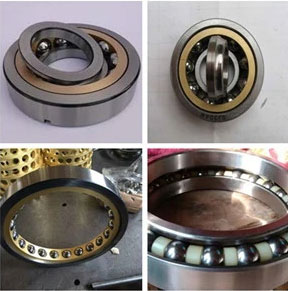Home / News / High Precision CNC Bearings: The Key to Superior Performance in Advanced Manufacturing
High Precision CNC Bearings: The Key to Superior Performance in Advanced Manufacturing
Introduction
High precision CNC bearings are essential components in the world of advanced manufacturing, where accuracy, speed, and reliability are of paramount importance. These bearings are specifically designed and engineered to meet the stringent requirements of computer numerical control (CNC) machines, ensuring smooth and precise operation. In this article, we will delve into the characteristics, advantages, and applications of high precision CNC bearings, highlighting their critical role in modern manufacturing processes.

Characteristics of High Precision CNC Bearings
High precision CNC bearings offer several unique characteristics that set them apart from standard industrial bearings:
Ultra-Precise Manufacturing: High precision CNC bearings are manufactured to extremely tight tolerances, resulting in minimal runout, consistent positioning, and improved machining accuracy.
High Rigidity: The rigidity of high precision CNC bearings is crucial in maintaining the stability of the machining process, ensuring the accuracy and quality of the finished product.
High-Speed Capability: These bearings are designed to operate at high speeds, enabling faster machining rates and increased productivity in manufacturing.
Long Service Life: High precision CNC bearings are made from high-quality materials and advanced manufacturing techniques, ensuring a long service life and reduced downtime for maintenance.
Advantages of High Precision CNC Bearings
The use of high precision CNC bearings in advanced manufacturing processes offers numerous advantages, including:
Enhanced Machining Accuracy: The ultra-precise manufacturing of high precision CNC bearings ensures minimal runout and consistent positioning, leading to improved machining accuracy and superior product quality.
Increased Productivity: High precision CNC bearings are designed for high-speed operation, enabling faster machining rates and higher productivity in manufacturing facilities.
Reduced Vibrations: The rigidity and precision of these bearings contribute to reduced vibrations during machining, resulting in smoother operation and enhanced product quality.
Extended Equipment Life: The long service life of high precision CNC bearings helps reduce downtime for maintenance and prolong the life of CNC machines, leading to cost savings and higher return on investment.
Applications of High Precision CNC Bearings
High precision CNC bearings are utilized across a wide range of industries and applications where precision and reliability are crucial, including:
Aerospace Manufacturing: The accuracy and reliability of high precision CNC bearings contribute to the production of critical aerospace components, such as aircraft engines, landing gear systems, and avionics.
Automotive Industry: High precision CNC bearings play a vital role in the manufacturing of high-quality automotive parts, including engine blocks, transmission components, and suspension systems.
Medical Device Manufacturing: The precision and reliability of high precision CNC bearings enable the production of advanced medical devices and instruments, such as surgical robots, dental handpieces, and orthopedic implants.
Electronics Manufacturing: High precision CNC bearings facilitate the production of intricate electronic components, including printed circuit boards, semiconductor devices, and sensors.
Conclusion
High precision CNC bearings are the key to superior performance in advanced manufacturing, offering unparalleled accuracy, speed, and reliability. Their unique characteristics, numerous advantages, and versatile applications contribute to the production of high-quality, precision-engineered components across a broad range of industries. As the demand for precision and efficiency in manufacturing continues to grow, high precision CNC bearings will undoubtedly play a pivotal role in meeting these needs, driving innovation and progress in the world of advanced manufacturing.
- Previous: CNC Machine Bearings: The Backbone of High Precision and Reliability in Modern Manufacturing
- Next: Ceramic CNC Bearings: Revolutionizing Precision and Performance in Modern Manufacturing











